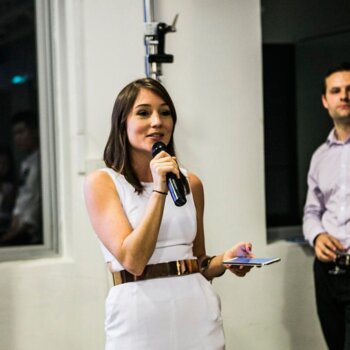(Women on Top in Tech is a series about Women Founders, CEOs, and Leaders in technology. It aims to amplify and bring to the fore diversity in leadership in technology.)
Theresa is the Founder & CEO of Play2Lead, a gamified microlearning and micropractices platform that helps teams unlock their full potential by building their EQ. She is an entrepreneur with a passion for gamification, mobile technology and education. Theresa spent the last 20 years working at blue-chip corporations such as ThoughtWorks, Andersen and Vodafone leading teams in Sales and Marketing, Finance as well as consulting engagements (strategy, risk management and process re-engineering). She is also a recent scholarship holder of the Search Inside Yourself Leadership Institute program, which was seeded in Google. Theresa leads her team at Play2Lead to curate world leading content on EQ and mindfulness, so that learners can increase their 21st century skills as we companies tackle the Fourth Industrial Revolution. She is especially passionate about improving focus, resilience, inclusivity and compassion in the workplace.
Play2Lead has won the Singapore Workforce Development Authority InnovPlus Flame Competition in April 2016, where they partnered with a global Virtual Reality platform provider to provide an integrated VR/mobile learning platform to improve safety training. They also got the 2nd prize on our solution to improve retail training of millenial staff by deepening customer empathy using VR and making microlearning fun through team-based and individual challenges created by trainers on our self-service platform.
What makes you do what you do?
A few years ago I had a stroke just as I started Play2Lead on the weekends, and it made me question whether I wanted to continue the corporate ladder, or to show my kids what it takes to follow your passion and find a way my startup could truly impact the world. So after a lot of rest, and many pivots later, I have still been able to get out of bed each day to lead Play2Lead to help companies build sustainably high performing teams. As we go deeper into the Fourth Industrial Revolution, I get to meet both employers and employees who are either confused or scared, and some are still clueless to proactively and strategically upskill to be future ready.
How did you rise in the industry you are in?
My startup is technically in HRTech (the learning and not the admin/process). I have no formal learning background except that I have always loved to learn, and in my corporate days as a fast tracker got several opportunities to talk at conferences and run internal trainings. We started noticing our growth was coming from trainers who wanted more engagement not just during their face-to-face events, but post-event. We also were the only startup to win 1stprize and 2nd prize in the Workforce Singapore Innovation Competition 2016 where we prototyped Virtual Reality merged with gamified mobile microlearning for Safety Training and Retail Training. Since then, we have demonstrated that we are one of the few startups that understand behavior change, gamification and Emotional Intelligence.
Why did you take on this role/start this startup especially since this is perhaps a stretch or challenge for you (or viewed as one since you are not the usual leadership demographics)?
As a non-technical founder, it wasn’t as scary starting because I’ve led technical teams in my previous startups and through my corporate life. However, the stretch is still because I’m a single founder who has been looking for a technical co-founder to lead the technical team and help me evolve my vision of enabling people to find contentment as they upskill for the Fourth Industrial Revolution.
Do you have a mentor that you look up to in your industries or did you look for one or how did that work?
I have advisers that I lean on for specific skills – I have two from Gartner (Talent Analytics and Talent Development), a Psychiatrist who works with both large enterprises and armed forces personnel, an Agile Software Engineer who runs Australia’s largest Ruby on Rails software development consultancy, and a Gamification Expert from the U.S. I found them by firstly identifying what skills I would need to complement my own, and I simply found them through Linkedin, and eventually convinced them to be my advisers. As for looking personal mentor, I am still looking for one.
Now as a leader how do you spot, develop, keep, grow and support your talent?
Spotting talent – my three key questions in an interview is to ask them:
- What they enjoy doing (and wait for the moment their eyes light up)
- To describe their last epic fail (and see how comfortable they are to explore their feeling and what they learnt).
- Describe the last time they worked with someone difficult. Why was that person difficult and what did you do?
- Who is your role model (male and female) and why?
Developing/grow/support talent – To be honest, I’ve been lucky to have developers who know what they need to develop, so they just let me know what and when they need to do their upskilling, and I just encourage them and get them to talk about it after they’re done.
Keep talent – This is really hard as a startup, because the developers that like working for a startup is because they usually have more autonomy, and if you get very lucky, they are committed to solving the problem, not just the new tech that they get to play with. It’s important to understand that they have a life too – which means keeping communication channels open as to their home life so that as a leader, I can be compassionate and flexible as required (e.g. sick kid so need to work from home).
Do you consciously or unconsciously support diversity and why?
I consciously support diversity (our full-time staff is 50/50) and we also have a Inclusivity course to help employees practice how to mitigate their unconscious bias (it’s not good enough just having the a-ha moment of knowing one has unconscious biases). There is also diversity in age, so I make a point to coach our interns so that they have a growth mindset in approaching their career choice and life.
What is your take on what it takes to be a great leader in your industry and as a general rule of thumb?
For me, a great leader in any industry is one who is courageous to be a visionary, and compassionate to his/her followers as they navigate through the uncertain future. A great leader is also one whose strength also lies in his/her vulnerability to share failures, and help others learn to be resilient.
Advice for others?
Anxiety and depression is already one of the biggest problems workplaces face and increasingly so because of the continued change in what future skills are required, and automation displacing existing jobs. Good employers will not train their people based on trends, but work at aligning their people’s existing strengths and interests to future skills need, and put employee culture and training at the top of the agenda. We need to move beyond employee engagement for its own sake (e.g. measure but do nothing, fun activities) or trendy training that has little if any ROI (e.g. Unconscious Bias training that only helps employees understand their biases, but not mitigate the biases).
We also need to teach team leaders how to hold the space for their team mates to be truly inclusive, and not watch for early warning signs of anxiety and depression. We need to upskill our leaders on how to give feedback with compassion, and welcome the whole person into our organization.
If you’d like to get in touch with Theresa Lim, please feel free to reach out to her on LinkedIn https://sg.linkedin.com/in/limtheresa or you can email her at [email protected]





























